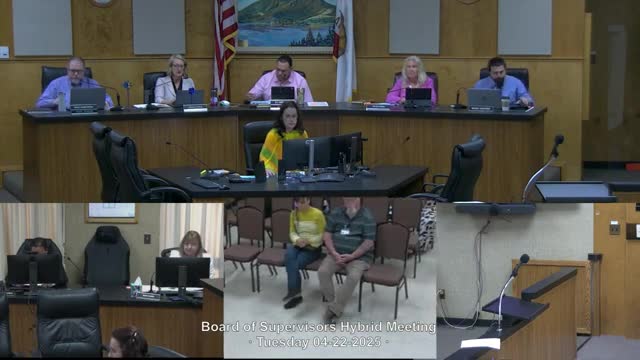Lake County proclaims April 2025 Alcohol Awareness Month; behavioral-health officials outline programs and local statistics
Get AI-powered insights, summaries, and transcripts
Subscribe
Summary
The Lake County Board of Supervisors on April 22 adopted a proclamation recognizing April 2025 as Alcohol Awareness Month. County behavioral-health staff described local drinking trends, DUI program activity and a new grant to expand medication-assisted treatment in DUI services.
The Lake County Board of Supervisors unanimously adopted a proclamation on April 22 designating April 2025 as Alcohol Awareness Month and heard presentations from county behavioral-health staff about prevention, treatment and local statistics.
The proclamation, presented by Vice Chair Rasmussen and signed by Chair E.J. Crandall, said Lake County Behavioral Health Services provided DUI program services to 563 participants in calendar year 2024, assisted with 566 substance-use treatment service requests and offered treatment services to 256 individuals. The proclamation also cited a county youth binge‑drinking rate of about 20.3% for ages 12 to 17, a figure the presenter said is multiple times the state average.
Elise Jones, director of Lake County Behavioral Health, thanked youth participants who joined the meeting and urged community support for prevention and recovery efforts. "You're up here being leaders, and showing that you can have fun and do cool stuff without that," Jones said.
Paul Verhey, a senior counselor who runs the county DUI program, described the county-run program and a recent state grant. "DUI is treatment," Verhey said. He outlined a new Department of Health Care Services grant for DUI medication‑assisted treatment (DUI MAT) that the county will use to provide early intervention and opioid/polysubstance services inside the existing DUI program. Verhey said the grant will expand access to integrated care, including MAT, outpatient services and partnerships for higher levels of care.
Verhey also reviewed county and national statistics: a 2023 study showed about 21.5% of Lake County adults self-reported heavy or binge drinking, and county death rates from chronic liver disease and cirrhosis placed Lake County first among California’s 58 counties for the 2018–2022 period, at 42.9 per 100,000 compared with a state average near 13 per 100,000. He said Lake County ranks sixth in fatal alcohol‑involved crashes per capita.
Representatives from Redwood Community Services and other local providers described services targeted to pregnant and parenting people, residential and outpatient services with childcare, and referrals for families seeking treatment.
Board members thanked county staff and community partners for prevention work and treatment access. Several supervisors praised community education aimed at younger residents and encouraged continued coordination across schools, community organizations and law‑enforcement partners.
The proclamation did not create new policy or funding; it was a formal recognition and an occasion for staff to summarize ongoing programs and newly awarded grants.
